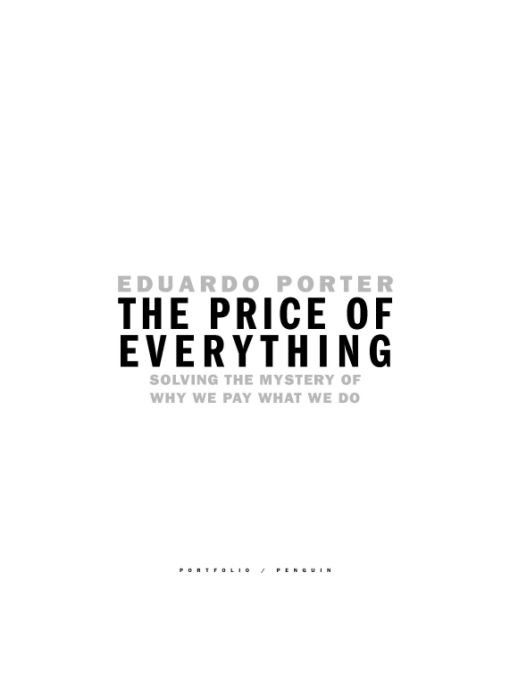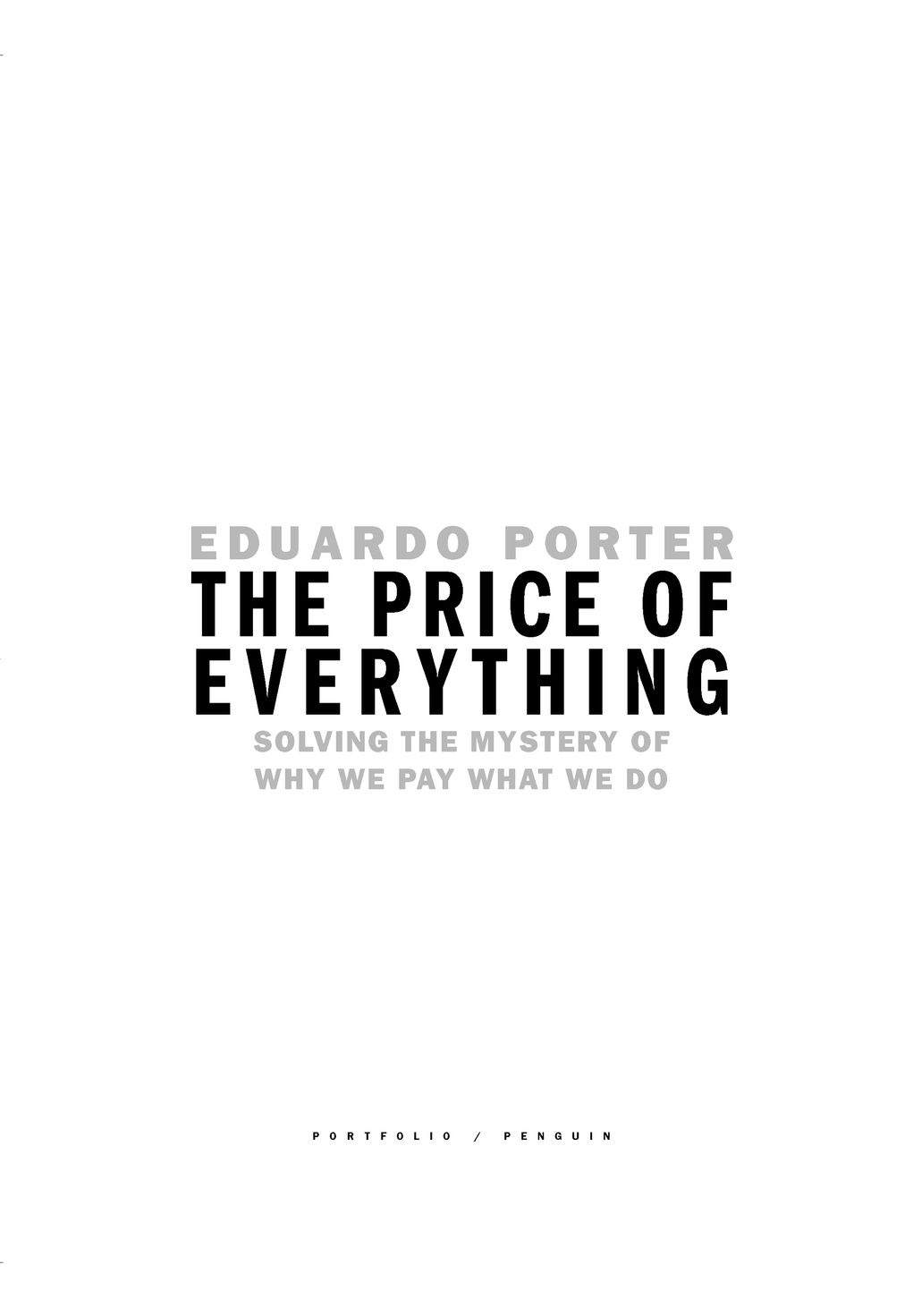The Price of Everything
Read The Price of Everything Online
Authors: Eduardo Porter

Table of Contents

PORTFOLIO/PENGUIN
Published by the Penguin Group
Penguin Group (USA) Inc., 375 Hudson Street, New York, New York 10014, U.S.A.
Penguin Group (Canada), 90 Eglinton Avenue East, Suite 700, Toronto,
Ontario, Canada M4P2Y3 (a division of Pearson Penguin Canada Inc.)
Penguin Books Ltd, 80 Strand, London WC2R 0RL, England
Penguin Ireland, 25 St. Stephen’s Green, Dublin 2, Ireland (a division of Penguin Books Ltd)
Penguin Books Australia Ltd, 250 Camberwell Road, Camberwell,
Victoria 3124, Australia (a division of Pearson Australia Group Pty Ltd)
Penguin Books India Pvt Ltd, 11 Community Centre, Panchsheel Park, New Delhi-110 017, India
Penguin Group (NZ), 67 Apollo Drive, Rosedale, North Shore 0632,
New Zealand (a division of Pearson New Zealand Ltd)
Penguin Books (South Africa) (Pty) Ltd, 24 Sturdee Avenue,
Rosebank, Johannesburg 2196, South Africa
Published by the Penguin Group
Penguin Group (USA) Inc., 375 Hudson Street, New York, New York 10014, U.S.A.
Penguin Group (Canada), 90 Eglinton Avenue East, Suite 700, Toronto,
Ontario, Canada M4P2Y3 (a division of Pearson Penguin Canada Inc.)
Penguin Books Ltd, 80 Strand, London WC2R 0RL, England
Penguin Ireland, 25 St. Stephen’s Green, Dublin 2, Ireland (a division of Penguin Books Ltd)
Penguin Books Australia Ltd, 250 Camberwell Road, Camberwell,
Victoria 3124, Australia (a division of Pearson Australia Group Pty Ltd)
Penguin Books India Pvt Ltd, 11 Community Centre, Panchsheel Park, New Delhi-110 017, India
Penguin Group (NZ), 67 Apollo Drive, Rosedale, North Shore 0632,
New Zealand (a division of Pearson New Zealand Ltd)
Penguin Books (South Africa) (Pty) Ltd, 24 Sturdee Avenue,
Rosebank, Johannesburg 2196, South Africa
Penguin Books Ltd, Registered Offices:
80 Strand, London WC2R 0RL, England
80 Strand, London WC2R 0RL, England
First published in 2011 by Portfolio/Penguin,
a member of Penguin Group (USA) Inc.
a member of Penguin Group (USA) Inc.
All rights reserved
Library of Congress Cataloging-in-Publication Data
Porter, Eduardo.
The price of everything : solving the mystery of why we pay what we do / Eduardo Porter
p. cm.
Includes bibliographical references and index.
The price of everything : solving the mystery of why we pay what we do / Eduardo Porter
p. cm.
Includes bibliographical references and index.
eISBN : 978-1-101-44451-1
1. Value. 2. Values. I. Title.
HG223.P67 2011
338.5’21—dc22
2010028526
HG223.P67 2011
338.5’21—dc22
2010028526
Without limiting the rights under copyright reserved above, no part of this publication may be reproduced, stored in or introduced into a retrieval system, or transmitted, in any form or by any means (electronic, mechanical, photocopying, recording or otherwise), without the prior written permission of both the copyright owner and the above publisher of this book.
The scanning, uploading, and distribution of this book via the Internet or via any other means without the permission of the publisher is illegal and punishable by law. Please purchase only authorized electronic editions and do not participate in or encourage electronic piracy of copyrightable materials. Your support of the author’s rights is appreciated.
For Gisele and Mateo
INTRODUCTION

Prices Are Everywhere
ANYBODY WHO HAS
visited a garbage dump in the developing world knows that value is an ambiguous concept. To most people in the developed world, household waste is worthless, of course. That’s why we throw it away. Apparently, Norwegians are willing to pay about $114 a ton for somebody else to sort their recyclables from the general garbage. A survey of families in the Carter community of Tennessee several years ago found they were willing to pay $363 a year, in today’s money, to avoid having a landfill nearby.
visited a garbage dump in the developing world knows that value is an ambiguous concept. To most people in the developed world, household waste is worthless, of course. That’s why we throw it away. Apparently, Norwegians are willing to pay about $114 a ton for somebody else to sort their recyclables from the general garbage. A survey of families in the Carter community of Tennessee several years ago found they were willing to pay $363 a year, in today’s money, to avoid having a landfill nearby.
But slightly beyond our immediate experience, waste becomes a valuable commodity. In Kamboinsé, outside Ouagadougou, Burkina Faso, farmers pay municipal trash haulers to dump unsorted solid waste on their sorghum and millet fields as fertilizer—bits of plastic included. The going rate in 2003 was 400 francs per ton. In New Delhi, a study in 2002 found that waste pickers earned two rupees per kilo of plastic soda bottles and seven rupees per kilo of hard plastic shampoo bottles. A child working on foot on Delhi’s dumps could make twenty to thirty rupees per day.
Waste, in fact, confronts us with the same value proposition as anything else. The price we put on it—what we will trade to have it, or have it go away—is a function of its attendant benefits or costs. A bagful of two-rupee plastic bottles is more valuable to an Indian child who hasn’t eaten today than to me, a well-fed journalist in New York. What she must do to get it—spend a day scavenging among the detritus of India’s capital, putting her life and health at risk—is, to her, not too high a price to pay because life is pretty much the only thing she has. She has little choice but to risk it for food, clothing, shelter, and whatever else she needs. I, by contrast, have many things. I have a reasonable income. If there’s one thing I have too little of, it is free time. The five cents I could get for an empty plastic bottle at the supermarket’s recycling kiosk are not worth the trouble of redeeming it.
The purpose of this comparison is not to underscore that the rich have more opportunities than the poor. It is that the poor choose among their options the same way the rich do, assessing the prices of their alternatives. The relative costs and benefits of the paths open to them determine the behavior of the poorest Indian girl and the richest American man. These values are shaped by the opportunities they have and the constraints they face. The price we put on things—what we will trade for our lives or our refuse—says a lot about who we are.
The price of garbage provides a guide to civilization. Pollution is cheapest in poor countries. Their citizens are more readily willing to accept filth in exchange for economic growth. Yet the relative price of pollution rises as people become richer. Eventually it becomes expensive enough that it can alter the path of development. China is a dirty place. Yet underlying its dismal air and foul water is a choice that balances the costs of pollution in bad health, poisonous rivers, and so forth against the cost of cutting back production or retooling plants to control their effluvia. It is a different choice from that of Switzerland, where preserving environmental assets—clean air, trees, wild animals—is considered more valuable than providing manufacturing jobs to unemployed farmers. Twice as many Swiss as Chinese are members of environmental organizations. More than a third of the Swiss population believes environmental pollution is the most important problem facing the nation; only 16 percent of Chinese feel the same.
But as China grows, the price of building one more coal-fired power plant, measured in terms of its contribution to acid rain, global warming, and the rest will one day exceed the value the Chinese place on the extra output. As it keeps growing, it will likely evolve out of the most noxious industries, like steel and chemicals, into less polluting sectors, like medical and financial services. It may even one day buy its steel and chemicals from poorer countries with a higher tolerance of foul water and air. In other words, it will behave more like Switzerland or the United States. One study concluded that emissions of sulfur dioxide peak when a country’s income per person reaches around $8,900 to $10,500. In the United States, sulfur-dioxide emissions soared until the passage in 1970 of the Clean Air Act. Since then, emissions have fallen by half.
HEREIN LIES THE
central claim of this book: every choice we make is shaped by the prices of the options laid out before us—what we assess to be their relative costs—measured up against their benefits. Sometimes the trade-offs are transparent and straightforward—such as when we pick the beer on sale over our favorite brand. But the Indian scavenger girl may not be aware of the nature of her transaction. Knowing where to look for the prices steering our lives—and understanding the influence of our actions on the prices arrayed before us—will not only help us better assess our decisions. The prices we face as individuals and societies—how they move us, how they change as we follow one path or another—provide a powerful vantage point upon the unfolding of history.
central claim of this book: every choice we make is shaped by the prices of the options laid out before us—what we assess to be their relative costs—measured up against their benefits. Sometimes the trade-offs are transparent and straightforward—such as when we pick the beer on sale over our favorite brand. But the Indian scavenger girl may not be aware of the nature of her transaction. Knowing where to look for the prices steering our lives—and understanding the influence of our actions on the prices arrayed before us—will not only help us better assess our decisions. The prices we face as individuals and societies—how they move us, how they change as we follow one path or another—provide a powerful vantage point upon the unfolding of history.
Nearly two decades ago, when he was chief economist of the World Bank, Lawrence Summers, President Barack Obama’s former top economic adviser, signed his name to a memo suggesting it would make sense for rich countries to export their garbage to poor ones. Because wages are lower in poor countries, he said, they would suffer a lesser loss if workers got sick or died. “I think the economic logic behind dumping a load of toxic waste in the lowest wage country is impeccable and we should face up to that,” it said. Moreover, pollution mattered less in a poor country with other problems: “The concern over an agent that causes a one in a million change in the odds of prostate cancer is obviously going to be much higher in a country where people survive to get prostate cancer than in a country where under 5 mortality is 200 per thousand.”
Leaked a few months before the 1992 United Nations Earth Summit in Rio de Janeiro, the memo confirmed to critics that the World Bank believed poor countries were dumps. The reasoning “is perfectly logical but totally insane,” wrote the late José Lutzenberger, then Brazil’s environment minister, in a letter to Summers. Furious, Vice President Al Gore torpedoed Summers’s chance to become chairman of then-president Bill Clinton’s Council of Economic Advisers. Summers apologized, explaining the memo as an attempt to offer “sardonic counterpoint” to sharpen analytical thinking about the trash trade.
Lutzenberger had a point. Wages are not the only benchmark of people’s value. The price of dealing with garbage in impoverished countries is often zero not because their citizens care nothing about pollution, but because their governments don’t enforce pollution-related laws. But Summers had a powerful point too: in poorer countries, an untainted environment is less valuable than other things that are more abundant in richer nations—schools, for instance. Many developing nations would serve their interests best by trading trash for the chance to build an extra one.

Other books
The Ballerina and the Revolutionary by Voiez, Carmilla
A Life of Inches by Douglas Esper
Sealed with a Kill by Lawrence, Lucy
Triple Witch by Sarah Graves
The Faithful Heart by MacMurrough, Sorcha
Phoenix Café by Gwyneth Jones
Al Capone Shines My Shoes by Gennifer Choldenko
0316382981 by Emily Holleman
The Abundance of the Infinite by Christopher Canniff
John Carter by Stuart Moore